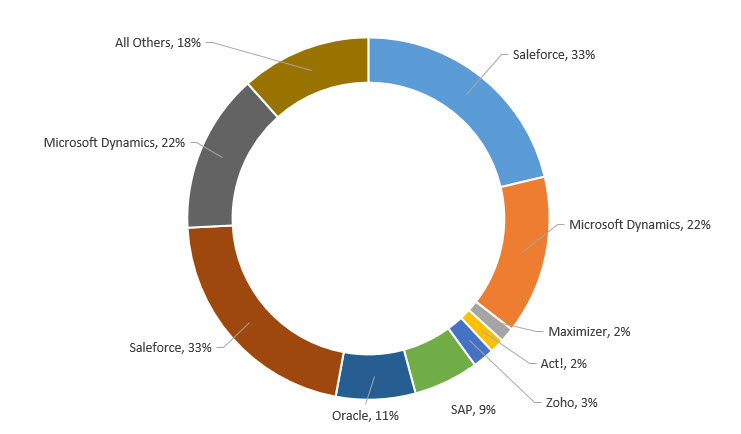CRM- customer relationship management plays a vital role in the growth and prosperity of the business. Leveraging cutting-edge technology, it streamlines, automates and sync the various processes such as sales, marketing, technical support and customer service involved in the business.
This all is done by managing and analyzing the customers' interaction in the whole customers' journey to strengthen the customers' relationship with the business. Increasingly, large and SMEs are embracing CRM solutions to give a leg up to their business.
According to the Gartner research, "The CRM market is anticipated to be a $36 billion market by 2017 and 53% of the leading companies are investing in CRM to drive sales."

In the market, a lot of companies are offering CRM solutions like- SAP, Oracle, Salesforce, Microsoft Dynamics and pretty more that enterprises leverage depending on the usage.
It's clear that presently among all the CRM solution providers, Salesforce and Microsoft Dynamics have a fair share of the market and enjoys the top 2 positions in the CRM world.
Sometimes, businesses get confused when it comes to zero in the choice to one CRM solution provider between the two- Salesforce and Microsoft Dynamics.
Before we clear up the air, let's shed some light on Salesforce CRM and Microsoft Dynamics CRM.
Salesforce is a world's number one CRM services provider that're cloud based, thus alleviating the need of hiring technical experts to set up, manage and make the CRM running smoothly. Presently, the services used by over 100,000 customers.
Microsoft Dynamics CRM is a product of Microsoft that's the best match for sales, marketing, services, social, and small and mid-size business. It's an IIS-based web application that supports web services interfaces.
Here, we have rounded up the difference between the two CRM solution providers. They are:
1) Available Deployment Options
Microsoft allows businesses to deploy the Dynamics CRM on the cloud, on-premise or partner-hosting. Instead, the Salesforce CRM offers can only be deployed on cloud-only.
2) Licensing
The license that Microsoft Dynamics CRM provides enables the businesses to get sales, marketing and service solutions alongside offer the added benefits such as customization without charging extra cost. The Salesforce CRM solution offers just three above mentioned modules and demands businesses to pay more if they need any changes.
3) Integration- easier or difficult?
Microsoft Dynamics CRM enables easy integration with a range of third-party software such as Intuit, Zendesk, live chat, Quickbooks and more. On the other hand, Salesforce CRM provides limited support to the integration where only a few services such as Desk.com, or Force.com can be implemented.
4) Language interface
Although both CRM services can be provided in multiple languages, Microsoft Dynamics CRM support 35 languages. The Salesforce CRM offers limited support and businesses can avail them in fewer languages.
5) Accessibility
It's not a difference between the two CRM as both of them have their own web and mobile apps and they are accessible on the myriad of web browsers.
6) The support
Customer support is key before selecting any services. Salesforce CRM offers training and support through telephonic conversation, whereas Microsoft Dynamics CRM provides telephonic support as well as ticket raising and live chat support functionality.
7) Customization
Microsoft Dynamics CRM is amazing in terms of customization as it's more flexible rather than Salesforce CRM because Dynamics CRM offers a 360â° customization facility.
Takeaway
Comparing the two is like weighing the equivalent balance in the scale. The reason is we can compare the two and illustrate the difference in their services or offerings. But, based on the differences, saying one superior and another inferior is also not justified.
The differences are just to make the situation vivid for the businesses so that they will select the one out of the two, which perfectly matches the needs.
Integrate the CRM services in your business by partnering with the best CRM solution provider.